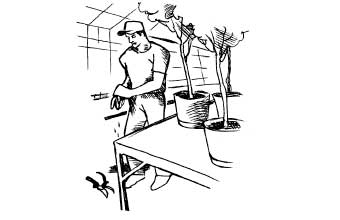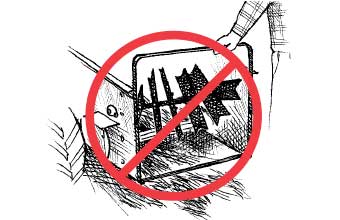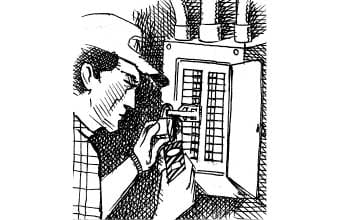Here are some key points.
- Never put your hands or fingers inside the moving parts of a machine.
- Get immediate medical attention for any cuts to your hands.
- Use good judgment and patience when working with machinery.
Hands are often taken for granted
Your hands are the most important tools you have when performing any on-the-job task in an agricultural setting. Yet, many workers make wrong decisions with their hands, especially when using machinery with moving parts. Hands and fingers can be crushed, mangled or even amputated when they get inside the chains, sprockets and other parts that allow the machine to operate. Small cuts or scrapes on fingers, knuckles and palms that are exposed to dirt, pesticides and other chemicals can lead to serious infection. Hands that come in contact with acids, solvents, and other harsh liquids may burn skin and result in such conditions as dermatitis. Repetitive movement of the hands, fingers and wrists can lead to carpal tunnel syndrome, a condition of the nerves. Severe hand injuries can also result in time away from the job and permanent disabling injuries.
What causes serious hand injuries?
- Most hand injuries result from a lack of patience or good judgment.
- Many times, they occur at the end of the day or week when you are tired or feel tasks should be done in a hurry, such as before a storm arrives.
- Machines that clog up continually may encourage you to reach inside with your fingers or hands to unplug them without shutting them down first.
- Your hands may also make inadvertent contact with machines that are running without protective shields and guards in place.
- It’s important that you get proper training to operate certain machines to reduce your risk of injury.
How to prevent hand injuries
- Never try to repair equipment while it is still running. If a machine malfunctions, turn it off, then immediately contact your supervisor.
- If you are feeding items into a machine, use a pushing block or stick. Never use your fingers or hands.
- Always make sure that all shields and guards are in place on the machine you are operating. If they are not, don’t use it, and immediately contact your supervisor.
- Use tools and other equipment that fit comfortably in your hand and can be used repeatedly without injury to your wrist or tendons. Also, try to keep your wrist in a neutral position.
- Always wear the right gloves if your hands are going to be exposed to chemicals that could harm the skin. Follow all label directions. Gloves are also important if you work all day around equipment that produces heat.
- Stretch your hands during breaks to give them a rest.
- Always know how to shut off a machine in case of an emergency. Talk to your supervisor if you need help.
- NEVER operate machinery or equipment under the influence of drugs or alcohol.
What to do in case of a hand injury
- If you receive a cut on your hand that appears minor, do not continue to work. Notify your supervisor and get immediate first aid.
- For more serious cuts and lacerations, apply pressure on the wound to control bleeding, wrap it with a clean cloth, and elevate the hand or limb above the heart. Immediately call for emergency medical help.
- For broken bones, place ice packs on the fracture, and immediately call for emergency medical help. Do not place ice directly on the injury.
- If a finger or hand is amputated, retrieve it if possible, wrap it in a moist towel or cloth, place it in a plastic bag or sealed container, and then on ice. Be careful not to freeze the amputated tissue. Call for medical help, and rush the amputated part to the hospital with the injured person.
Hand Protection Do’s and Don’ts
Do
- Immediately shut off all malfunctioning equipment. Don’t put your hand inside to fix it.
- Make sure all shields and guards are in place on a machine before you use it.
- Always wear the right gloves when working with chemicals.
Don't
- Put your hands or fingers into a machine while it’s running.
- Ignore minor hand injuries. They could become infected.
- Operate any equipment without proper training.
When you’re ready to work safely, you’re ready to work. See our full line of safety supplies, including respirators, eye and ear protection, coveralls, first aid and more.










